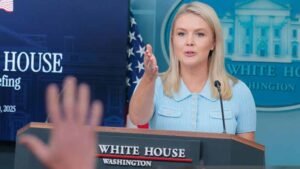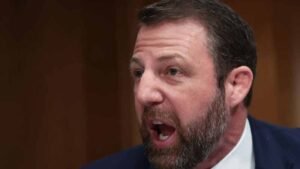
REUTERS/Marco Bello
Former President Donald Trump has intensified his long-running battle with the press, once again turning a routine White House media briefing into a platform for public confrontation and criticism of journalists. In a series of escalating incidents, Trump and his administration have taken direct aim at individual reporters, major news networks, and even defied a federal court ruling — all while demanding what he considers more “favorable” coverage. told by AOL.
Clashing With Kaitlan Collins
At the center of Trump’s latest media clash was CNN’s White House correspondent Kaitlan Collins. During a press event on Monday with El Salvador’s President Nayib Bukele, Collins began asking a question regarding the Supreme Court’s ruling to reinstate Kilmar Abrego Garcia — a Maryland resident mistakenly deported to El Salvador, where he was imprisoned.
Before she could finish, Trump interrupted sharply:
“Let’s hear the question from this very low-rated anchor at CNN,” he sneered.
“How long do we have to answer this question from you? Why don’t you just say, ‘Isn’t it wonderful that we’re keeping criminals out of our country’? Why can’t you just say that?” Trump continued. “That’s why nobody watches you anymore. You have no credibility.”
The exchange underscored Trump’s ongoing push to discredit journalists who challenge his administration’s narrative, especially those from outlets he routinely brands as “fake news.”
Administration Joins In
Trump wasn’t alone in his attack. Members of his administration took turns backing him up and turning the briefing into a collective media takedown.
Stephen Miller, White House deputy chief of staff for policy, harshly dismissed the question about Garcia, claiming:
“This is an illegal alien from El Salvador. He’s a citizen of El Salvador. It’s very arrogant, even for American media, to suggest we dictate how El Salvador handles their own citizens.”
Miller went on to claim that Garcia is a member of MS-13, the notorious gang Trump has repeatedly used to justify aggressive immigration enforcement — despite no criminal charges or documented gang affiliations being held against Garcia. reported by Huff Post.
“If he was your neighbor,” Miller told Collins, “you would move right away.”
Secretary of State Marco Rubio echoed Miller’s sentiment, adding, “I don’t understand what the confusion is,” in response to Collins’ questions.
Media Retaliation and Federal Defiance
Just a day earlier, Trump had taken to his social media platform to lash out at CBS over a “60 Minutes” segment he deemed “defamatory,” urging Federal Communications Commission (FCC) Chairman Brendan Carr to fine and penalize the network for what he called “unlawful and illegal behavior.”
Carr, who has already opened investigations into NPR and PBS over alleged advertising violations, could potentially delay or block a major merger between CBS’s parent company, Paramount Global, and Skydance Media — a move critics say reeks of political retaliation.
But the most striking breach came on Monday when The Associated Press (AP) revealed that its reporter and photographer were barred from attending the White House press pool during the joint Trump-Bukele appearance — a clear violation of a federal injunction that prohibits Trump from punishing the AP.
“We expect the White House to restore AP’s participation in the [White House press] pool as of today,” said Lauren Easton, an AP spokesperson. “This is not only a breach of protocol but a defiance of legal protections granted to a free press.”
A Pattern of Pressure
This isn’t the first time Trump has used his platform to demand loyalty from the media or pressure networks with threats of government action. But the scale of these recent moves — including coordinated attacks from senior officials, public calls for punishment, and outright defiance of court orders — signals a dramatic escalation.
What concerns many watchdogs is not just Trump’s rhetoric, but the willingness of government agencies and figures to act on it.
Free press advocates warn that the pattern could set a dangerous precedent for future administrations. “When leaders retaliate against journalists for doing their jobs, democracy suffers,” one media law expert commented.


